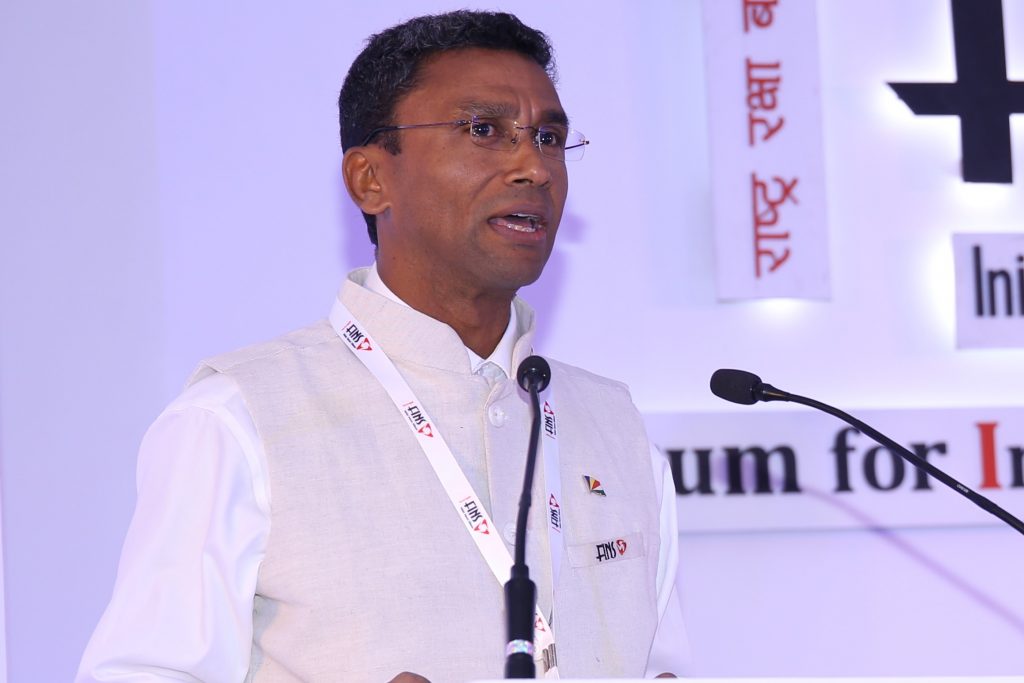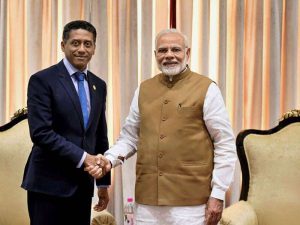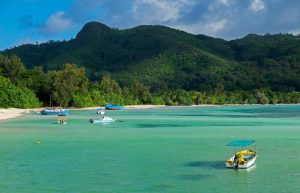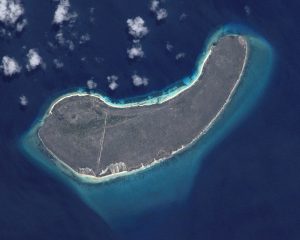EDITOR’S NOTE
Of late India has stepped up its Indian Ocean engagement by entering into various agreements with smaller but strategically located island nations in the IOR. These nations include Mauritius, Sychelles, Oman to name just three. A pact to build a common facility at Assomption island in Seychelles, signed in 2015 and then amended early this year has however run into a roadblock thanks to the refusal of the Opposition party in Seychelles to ratify it. So what happens next? Barry Faure, Secretary of State in the Seychelles Department Of Foreign Affairs provides some answers in an exclusive interview to our Editor-in-Chief Nitin A. Gokhale.
BARRY FAURE (BF): We are conscious of the fact that since Seychelles’ discovery, her geopolitical and strategic location in the western Indian Ocean has featured prominently in various powers, military and foreign policy aspirations. However, Seychelles has managed to maintain sovereignty over its territorial waters and has since independence fervently supported the idea of an Indian Ocean zone of peace which was spearheaded by the late Indian Prime Minister, Indira Gandhi.

Barry Faure Speaking at an Indian Ocean Conference organised by FINS in Goa (October 2017)
In addition Seychelles has also practiced the maxim of friend to all enemy to none. In this regard, Seychelles conducts its relations with its international partners on an equal footing in the spirit of mutual respect. Furthermore, Seychelles believes in the principles and primacy of international law and chooses to believe that the rest of the international community is of the same view.
NG: How does Seychelles cope with the demands?
BF: Seychelles is an independent state within the family of nations. At times one could be lead to believe that the voices of small states are drowned by the roars of the more powerful. Seychelles has demonstrated that as a small island nation what is said as one can still have great impact. As such, as an independent nation conscious of the aspirations of our people; we do not give in to demands nor have any been imposed on us to date.
NG: How would you describe Seychelles foreign policy?
BF: Seychelles’ foreign policy is centred on peace, security, lasting prosperity, a sustainable future for all peoples through combating the adverse impacts of a changing climate and the vulnerabilities facing small island developing states such as our own.
NG: How would you characterize the current India-Seychelles relationship?

Image Courtesy: seychellesindiaday.net
BF: The Indo-Seychelles relationship is excellent. It accentuates how the world’s largest democracy can effectively collaborate with one of the world’s smallest in the spirit of understanding, mutual respect and friendship without preconditions. It is truly an example of positive engagement which should be replicated. Seychelles and India share a common history. Some of the first settlers to our islands originated from the subcontinent. Today, the Indian community which integrated into Seychellois society is a driver of commercial activity and also serves as a bridge connecting our two peoples sharing the same oceanic space.
NG: For years, the ties between the two countries have been under the radar and not really topic of discussion in international arena. But suddenly there is lot of interest in strategic circles. What has changed?
BF: In the modern twenty-four hour news cycle, sensationalism tends to reign supreme. It is unfortunate that the deep levels of engagement across numerous fields throughout the long years of Indo-Seychellois cooperation has been given less coverage and traction.
NG: Central to India-Seychelles relationship is the defence partnership. For the past decade, and particularly since 2015, India has ramped up supply of crucial defence equipment and platforms as well as increased training. Do you think there’s further scope for enhancing defence cooperation?

Seychelles President Danny Faure with Indian Prime Minister Narendra Modi
BF: The Indo-Seychellois defence partnership is a dossier of great importance to both countries. Seychelles and India have actively worked on the defence component of their relations since the establishment of diplomatic relations which certainly precedes 2015 which you mention. Securitising the Indian Ocean is high on both Seychelles and India’s agendas. The same ocean bathes both of our shores. As such, we have a vested interest to safeguard this shared oceanic space to ensure peace and stability in the region and further afield. As with our other partners in the defence sector, we welcome greater engagement in this field which will help in our own capacity building and technical know-how.
NG: The 2015 agreement between the two countries to jointly develop military facilities on the Assomption Island appears to have run into rough weather with the Opposition refusing to ratify the agreement. So what happens now?
BF: It is Government’s view that the proposed joint facility on the island of Assomption will ensure greater territorial integrity and help to secure that particular quadrant of Seychelles vast exclusive economic zone from an array of maritime threats. I believe that everybody is aware of the urgency and necessity to have an operational facility in this area to ensure that Seychelles has a viable and secure future. Government is certainly committed to this idea.
NG: What is the reason behind the Opposition’s stand, especially after it had assured the Seychelles and Indian governments of full support to the project?

Image Courtesy: Indiaabroad.com
BF: Those of us that worked tirelessly to bring this agreement to fruition for the benefit of both of our peoples are technocrats. I cannot speak for the politicians.
NG: Is there a way out?
BF: We do not want a way out of a project. We sincerely believe in its merits which will bring great benefit.
NG: Do you think some other powers are trying to stall the agreement?
BF: There are certainly vested interests which is to be expected in a pluralistic society. The ultimate decision is that of the people. If you are referring to other great powers who may have a strategic reason to ensure that a joint Indian-Seychelles facility does not come into existence in terms of a ‘Cold War-esq’ rivalry for primacy in the Indian Ocean, I would consider the argument baseless and pure fiction. It is important to note that Seychelles remains open to similar projects with its other key allies in other parts of its EEZ should the need arise and based on mutually agreed terms.
NG: If the agreement doesn’t get implemented, do you think it will affect the relationship or as

Image Courtesy: afrotourism.com
democratic nations, both India and Seychelles would move on and wait for opportune movement to revive the project?
BF: Seychelles and India’s relationship does not function because of this ‘one’ project. The project came into being because of the exemplary relationship shared by our two countries. In other words, the Assomption project is a byproduct of decade’s worth of friendly relations which have culminated in the elaboration of a joint Indo-Seychellois facility on the island of Assomption.
The Agreement signed in January 2018 is not going forward. However, Seychelles still needs to develop the facilities. We are happy that India is still committed to assist us.
NG: Thank you for taking out the time to speak to us.

April 27, 2018 -
The government of Seychelles is a minority government and the agreement was voted against by the majority opposition party in Parliament. The people of Seychelles is demanding a referendum on this issue of Assumption Indian Military Base under the guise of a Seychelles Coast Guard Base. The people of Seychelles is well aware of this guise. The government is playing deaf because they know it will lose in a vote by the people on the issue.